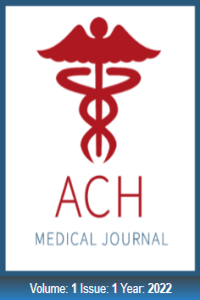Investigating the Relationship of Vitamin D Deficiency and Certain Biochemical Parameters with Depression
Investigating the Relationship of Vitamin D Deficiency and Certain Biochemical Parameters with Depression
Depression Vitamin D, Beck’s Depression Inventory,
___
- 1-Spitzer RL, Kroenke K, Williams JB. Validation and utility of a self-report version of PRIME-MD: the PHQ primary care study. Primary Care Evaluation of Mental Disorders. Patient Health Questionnaire. JAMA. 1999 Nov 10;282(18):1737-44.
- 2-Bertone-Johnson, Elizabeth R. "Vitamin D and the occurrence of depression: causal association or circumstantial evidence?." Nutrition reviews 67.8 (2009): 481-92.
- 3- Eyles DW, Smith S, Kinobe R, Hewison M, McGrath JJ. Distribution of the vitamin D receptor and 1 alpha-hydroxylase in human brain. J Chem Neuroanat 2005; 29: 21–30.
- 4-Ginde AA, Liu MC, Camargo CA. Demographic differences and trends of vitamin D insufficiency in the US population, 1988–2004. Arch Intern Med 2009; 169: 626–32.
- 5-Cora McGreevy, Miriam Barry, Colin Davenport, et al. The effect of vitamin D supplementation on arterial stiffness in an elderly community-based population. J Am Soc Hypertens. 2015 Mar;9(3):176-83.
- 6-Eyles, D.W., Smith, S., Kinobe, R., Hewison, M,.& McGrath, J.J. Distribution of the vitamin D receptor and 1 alpha-hydroxylase in human brain. Journal of Chemical Neuroanatomy (2005) 29(1):21-30.
- 7-Prüfer, K., Veenstra, T.D., Jirikowski, G.F., & Kumar, R. Distribution of 1,25- dihydroxyvitamin D3 receptor immuno reactivity in the rat brain and spinal cord. Journal of Chemical Neuroanatomy, (1999) 16(2):135-45.
- 8-Beck AT. An inventory for measuring depression. Arch Gen Psychiatry 1961;4(6):561-71.9-Guy W. Clinical Global Impressions: ECDEU Assessment Manual for Pharmacology, revised edition. National Institute of Mental Health, Dept. of Health, Education and Welfare Publication (ADM). 1976:218- 22.
- 10-Nisha Saji Parel, Parimi Vamsi Krishna, Anuradha Gupta, et al. Depression and Vitamin D: A Peculiar Relationship. Cureus. 2022 Apr 21;14(4):e24363.11-Geng C, Shaikh AS, Han W, et al. Vitamin D and depression: mechanisms, determination and application. Asia Pac J Clin Nutr. 2019;28:689–94.
- 12-Lars Libuda , Björn-Hergen Laabs , Christine Ludwig , et al. Vitamin D and the Risk of Depression: A Causal Relationship? Findings from a Mendelian Randomization Study, Nutrients. 2019 May 16;11(5):1085.
- 13-Leila Kamalzadeh , Malihe Saghafi , Seyede Salehe Mortazavi , Atefeh Ghanbari Jolfaei. Vitamin D deficiency and depression in obese adults: a comparative observational study, BMC Psychiatry. 2021 Nov 30;21(1):599.
- 14-Vikas Menon, Sujita Kumar Kar, Navratan Suthar, Naresh Nebhinani. Vitamin D and Depression: A Critical Appraisal of the Evidence and Future DirectionsIndian J Psychol Med 2020 Jan 6;42(1):11-21.
- 15-Ramos M.I., Allen L.H., Haan M.N., Green R., and Miller J.W. Plasma folate concentrations are associated with depressive symptoms in elderly Latina women despite folic acid fortification. Am. J. Clin. Nutr. 2004; 80: pp. 1024-28.
- 16-Sachdev P.S., Parslow R.A., Lux O., et al. Relationship of homocysteine, folic acid and vitamin B12 with depression in a middle-aged community sample. Psychol. Med. 2005; 35: pp. 529-38. 17-Reynolds E.H., Preece J.M., Bailey J., and Coppen A.: Folate deficiency in depressive illness. Br. J. Psychiatr. 1970; 117: pp. 287-92.
- 18-Papakostas G.I., Petersen T., Mischoulon D., et al. Serum folate, vitamin B12, and homocysteine in major depressive disorder, Part 2: predictors of relapse during the continuation phase of pharmacotherapy. J. Clin. Psychiatr. 2004; 65: pp. 1096-98.
- 19-Levitt A.J., and Joffe R.T. Folate, B12, and life course of depressive illness. Biol. Psychiatr. 1989; 25: pp. 867-72.
- 20-Ansley Bender, Kelsey E. Hagan and Neal Kingston. The association of folate and depression: A meta-analysis,. Journal of Psychiatric Research, 2017-12-01, Volume 95, 9-18.
- 21-P. Sangle, O. Sandhu, Z. Aftab, A.T. Anthony, S. Khan. Vitamin B12 supplementation: preventing onset and improving prognosis of depression. Cureus, 12 (10) (2020)
- 22-L.E.M. Elstgeest, I.A. Brouwer, B.W. Penninx, N.M. Van Schoor, M. Visser. Vitamin B12, homocysteine and depressive symptoms: a longitudinal study among older adults. Eur. J. Clin. Nutr., 71 (4) (2017), 468-75.
- 23-S. Markun, I. Gravestock, L. Jäger, et al. Effects of vitamin B12 supplementation on cognitive function, depressive symptoms, and fatigue: a systematic review, meta-analysis, and meta-regression. Nutrients, 13 (3) (2021), p. 923.
- 24-A. Rajizadeh, H. Mozaffari-Khosravi, M. Yassini-Ardakani, A. Dehghani. Effect of magnesium supplementation on depression status in depressed patients with magnesium deficiency: a randomized, double-blind, placebo-controlled trial. Nutrition, 35 (2017), 56-60.
- 25-E.K. Tarleton, A.G. Kennedy, G.L. Rose, A. Crocker, B. Littenberg. The association between serum magnesium levels and depression in an adult primary care population. Nutrients, 11 (7) (2019), 1475.
- 26-Anna Serefko , Aleksandra Szopa , Ewa Poleszak. Magnesium and depression. Magnes Res. 2016 Mar 1;29(3):112-19.
- 27-Shinsuke Hidese, Kenji Saito, Shinya Asano, Hiroshi Kunugi. Association between iron-deficiency anemia and depression: A web-based Japanese investigation. Psychiatry Clin Neurosci. 2018 Jul;72(7):513-21.
- 28-Ittermann T, Völzke H, Baumeister SE, Appel K, Grabe HJ. Diagnosed thyroid disorders are associated with depression and anxiety. Soc Psychiatry Psychiatr Epidemiol. 2015;50:1417–25
- Başlangıç: 2022
- Yayıncı: Ankara Şehir Hastanesi
Influences on Family Medicine Career Choice: Implications for Healthcare Development
Şeyma Handan DOĞAN, Tarık Eren YILMAZ, Adem ÖZKARA
The Need for Emergency Case Management in Family Medicine: A Capital City Case
Tuğba YILMAZ, Tarık Eren YILMAZ, Eren USUL
Tanju KETEN, Ali Yasin OZERCAN, Burak KÖSEOĞLU, Ahmet Burak YILMAZ, Ünsal EROĞLU, Yalçın KIZILKAN, Melih BALCI, Özer GÜZEL, Yılmaz ASLAN, Cüneyt ÖZDEN, Altuğ TUNCEL
Gökçe Naz KÜÇÜKBAŞ, Nazan AKGÜN KORUK
Erhan Renan UÇAROĞLU, Ufuk Turan Kürşat KORMAZ, Yusuf VELİOĞLU, Kemalettin ERDEM
Silent Pneumoperitoneum in a Major Burn Earthquake Survivor: Sigmoid Diverticular Perforation.
Merve AKIN, Tezcan AKIN, Ayse KARABAĞLI, Ahmet Çınar YASTI
Management of Non-Surgical Traumatic Facial Nerve Injuries
The Effect of Ticagrelor on Survival of Skin Flap in Rat Model
